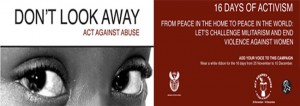The campaign, started in 1991, has seen over 5 000 organisations, policymakers, governments and countless individuals from over 180 countries worl dwide stand together for a united cause. South Africa adopted the campaign in 1998 as one of the intervention strategies towards creating a society free of violence.
dwide stand together for a united cause. South Africa adopted the campaign in 1998 as one of the intervention strategies towards creating a society free of violence.
This year the 16 days campaign will focus specifically on moving forward towards a non-violent South Africa and aims to raise awareness among South Africans about the negative impact of violence against women and children.
Organisations will be actively focused, more so than usual, on encouraging people to speak out if they find themselves or their children in abusive relationships.
According to ER24 trauma support co-ordinator, Henning Jacobs, victims who chose to keep quiet or who were never taken seriously when young must seek justice by reporting the perpetrator.
“Crimes such as rape or molestation committed by a father, uncle or someone close like a brother or family friend, are shockingly common. Girls and boys should be informed about what behaviour is okay and what is not. Make them aware of their bodies.
“Parents should ensure they have a great relationship with their children so that children are comfortable telling them anything,” he said.
There are several long-term effects of sexual abuse on children. These include psychological disorders, such as depression, suicidal tendencies and other problems with a spouse or partner later on in life.
Jacobs said that children who were sexually assaulted sometimes become adults who sexually assault children as well.
People who know that someone was or is being sexually assaulted should not keep quiet. He said adults must understand that by keeping quiet, they are indirectly telling the child they are lying and are not trusted. Jacobs said that there are many reasons why adults keep quiet about abuse. One of the main reasons is that they are financially dependent and fear for their lives.
“It is also illegal to keep quiet. Whenever a law is broken and someone is told about it, that person is according to law, obliged to take further steps,” said Jacobs.
The campaign uses a white ribbon during the 16-day period, which is a symbol of peace and symbolises the commitment of the wearer to never commit or condone violence against women and children.
Here are the steps what to do:
*Encourage silent female victims to talk about abuse and ensure that they get help.
*Report child abuse to the police.
*Encourage children to report bully behaviour to school authorities.
*Men and boys are encouraged to talk about abuse and actively discourage abusive behaviour.
*Seek help if you are emotionally, physically or sexually abusive to your partner and/or children. Call *Talk to friends, relatives and colleagues to take a stand against abuse of women and children.
*Try and understand how your own attitudes and actions might perpetuate sexism and violence.
Stop Gender Based Violence helpline at 0800 150 150.
